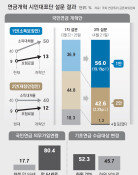President Moon’s controversial Memorial Day speech
President Moon’s controversial Memorial Day speech
Posted June. 07, 2019 07:31,
Updated June. 07, 2019 07:31
“There is no left or right when it comes to patriotism,” said President Moon Jae-in in his Memorial Day speech on Thursday, adding, “Be is a conservative or a liberal, anyone obsessing with vested interests is not truthful.” He also stressed the importance of ROK-US alliance, proposing to think of patriotism in a commonsensical way and work towards a more integrated society. The message called for bipartisan unity through a sense of devotion to serve and defend the nation.
President Moon added that the country’s achievements such as national independence and democracy are a product of the efforts by both conservatives and liberals, urging people to give due credits for their role: conservatives for the country’s economic development and liberals for the progress they made for democratization. The South Korean president reemphasized the value of ROK-US alliance, calling the United States the country that sacrificed the most to bring freedom and peace to the Korean Peninsula.
It was quite timely that President Moon spoke of the values of integration, patriotism, and alliance in the midst of extreme partisan strife. Then, he abruptly mentioned Kim Won-bong, an anarchist and independence activist from Korea’s colonial era, in his official memorial address. He claimed that the country could have mustered the capacity to fight for independence thanks to the addition of the Korean volunteer corps led by Kim to the country’s independence army. “The military capacity bolstered by the Allied Forces served the foundation of national army and ROK-US alliance,” added the president.
Kim Won-bong defected to the North in 1948 to participate in establishing the political leadership in Pyongyang, subsequently serving major posts under the regime as National Censorship and Labor Ministers. In March 1952, he even received a supreme medal from Kim Il-sung, the founding leader of North Korea, for his contributions during the Korean War. Controversies surrounding Kim Won-bong still remain as there is an opposite point of view about his military activities. It is hard to understand why Moon had to mention Kim’s name when a consensus about him has yet to be built even among historians. Furthermore, it is much doubtful if it was absolutely necessary to discuss Kim Won-bong as context of the foundation of national army and ROK-US alliance.
In response to his speech, opposition parties such as the Liberty Korea Party and the Bareunmirae Party slammed the remarks as “foundation work for Kim Won-bong’s decoration.” Instead of bringing people together as intended, the presidential speech presented a new bone of contention. In order for President Moon’s vision for bipartisan unity to come true, he needs to be much more prudent in evaluating a figure whose past records are still a subject of controversy.







